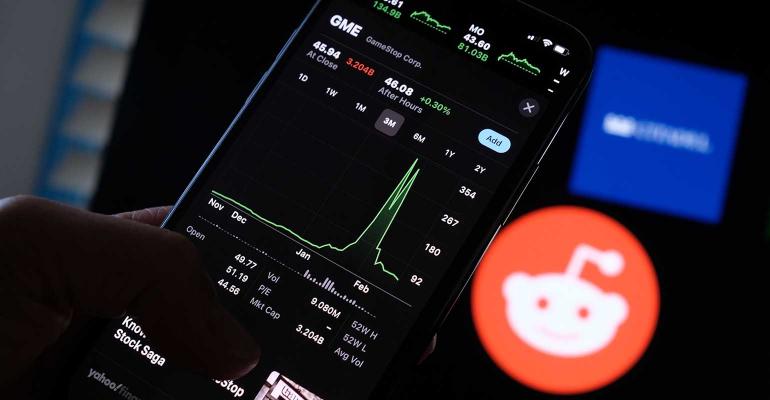(Bloomberg) -- If investors needed another sign the heyday for meme stocks has passed, an exchange-traded fund designed to ride the pandemic-era rise of retail traders is shuttering after just two years.
Roundhill Investments announced last week that it will liquidate the Roundhill MEME ETF (ticker MEME) in December, along with two other funds. MEME — which screened companies based on social-media activity and short interest — had accumulated just $2.6 million in assets since and is trailing the benchmark S&P 500 by around 60% since its December 2021 inception.
So-called meme stocks entered the lexicon in 2021 as legions of retail traders convened on social media to orchestrate massive short squeezes in the like of GameStop Corp. and AMC Entertainment Holdings Inc., fueling triple-digit rallies in some cases. Issuers were quick to latch onto the craze, but funds such as MEME and the $57 million VanEck Social Sentiment ETF (BUZZ) have struggled to gain an audience.
“A 2021 phenomenon wrapped into an ETF simply doesn’t work in today’s environment,” said Nate Geraci, president of The ETF Store, an advisory firm. “A niche strategy, zero financial adviser participation, and massive underperformance is a classic recipe for ETF closure.”
A slew of retail-focused ETFs launched during the height of the pandemic as Wall Street issuers rushed to capitalize on the extremely active day-trading crowd flush with government stimulus. But that frenzy has since declined as the Federal Reserve launched its most aggressive monetary policy tightening in decades. Industry experts said it’s no surprise that such funds — born in the crowded $7.5 trillion ETF space in which more than 3,330 US ETFs already exist — are struggling.
To be sure, retail traders are alive and well in equities, as well as other corners of the market including zero-day options and foreign currency trading. Just this month, investors piled into the shares of bankrupt companies, WeWork Inc. and trucking company Yellow. Their force is just not of the same magnitude as during the pandemic. Retail traders last month sold nearly $16 billion in stocks, according to S&P Global Market Intelligence, a selloff that reveals fading enthusiasm for equities from day traders.
The problem with ETFs like MEME is the lack of longevity, said Amrita Nandakumar, president at Vident Asset Management. She gave the $1.3 billion ROBO Global Robotics and Automation Index ETF (ROBO) as an example, which launched in 2013 and has more than doubled since its inception. Unlike MEME, she said ROBO — which tracks companies investing in the robotics, automation and AI revolution space — is a thematic fund that does not simply ride on the momentum.
“Fads tend to be retail investor-driven,” Nandakumar said. “Institutions — the driver of flows — don’t tend to invest in themes. ESG is one of the few exceptions to that. If a theme is short-lived, financial advisers are not likely to support it.”
Read more: Individual Investors Pull Most Cash From US Stocks in Two Years
MEME launched in Dec. 2021 to track the Solactive Roundhill Meme Stock Index. The fund will cease trading in December and no longer accept creation or redemption orders, according to the firm’s website.
“This is the purging of some of those ETFs that were launched that really didn’t have a portfolio in a zero-percent interest rate era,” Todd Sohn, ETF and technical strategist at Strategas Securities, said on Bloomberg Television’s ETF IQ. Sohn added that he was surprised the fund took this long to liquidate given the speculative profile of the portfolio.





